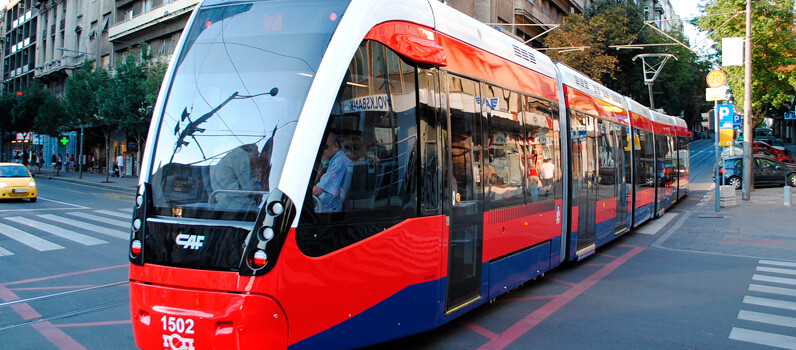Rights and Accountability 25 February 2019

Spanish firm CAF is bidding to expand Israel’s Jerusalem light rail system, which will help entrench its illegal settlements in the occupied West Bank. (CAF)
Last month, the workers council of Spanish train manufacturer CAF voted against participation in the Jerusalem light rail.
The council urged the Basque Country-based company to withdraw from the tender for the expansion of the tramway linking Israeli settlements in the occupied West Bank to Jerusalem.
“Any transit project in any city in the world, including Jerusalem, must be built while respecting human rights and international law,” the workers council stated.
“Both the United Nations General Assembly and the Security Council, as well as the International Court of Justice, through different resolutions, have opposed the occupation of the territories through which the tramway will pass.”
The transfer of Israel’s civilian population to settlements in the occupied West Bank, including East Jerusalem, as well as to Syria’s Golan Heights, is a war crime under international law.
Today, more than 200,000 settlers live in and around East Jerusalem, and more than 400,000 others live in the rest of the West Bank.
The CAF workers can count on the support of ELA, the most influential trade union in Basque Country.
“It is incomprehensible that the management of CAF is bidding for this tender,” the trade union stated. “CAF’s workers do not deserve to assume the responsibility for carrying out a job rejected by the overwhelming majority of the international community.”
Erroneous media reports in recent weeks stated that CAF itself had refused to take part in the project, but this is not the case.
The company “has not refused to participate in the tender of the Jerusalem tram,” CAF spokesperson Iñaki Escrig informed The Electronic Intifada by email.
Rather, it is the workers council – the legally mandated framework for labor representation – which has rejected participation.
If the company wins the tender, it could be a prelude to action by the trade unions.
Light rail expansion
Last June, companies were invited to bid for the expansion of the Jerusalem light rail, which includes extending the existing Red line and developing a second line, the so-called Green line.
The extension will penetrate deeper into the occupied West Bank, connecting the settlements of Pisgat Zeev and Neve Yaakov, which are part of the ring of colonies Israel is building to isolate Palestinians in Jerusalem from those in the rest of the West Bank.
The second line will run from Mount Scopus in occupied East Jerusalem to the settlement of Gilo, southwest of Jerusalem.
A consortium of the Israeli company Shapir Engineering and the Spanish train manufacturer CAF is reportedly shortlisted to develop the second line.
Competing consortia include the Canadian engineering giant Bombardier, Australia’s Macquarie and Japan’s Hitachi.
The bid must cover the operation costs for at least 15 years and the maintenance costs for 25 years.
CAF’s spokesperson told The Electronic Intifada that it “does not provide information or publish statements on ongoing bids.”
Entrenching settlements
The light rail is part of the 1990 Jerusalem Transportation Master Plan, sponsored by the Israeli government and the occupation authorities running the Jerusalem municipality.
A well-functioning transport system makes living in a settlement even more attractive. The light rail network therefore helps Israel entrench its occupation of the West Bank and the system of apartheid that comes with it.
International human rights organizations and the United Nations have all warned against complicity in Israel’s settlements through trade or business.
“Businesses play a key role in facilitating the overall settlement enterprise, contributing to Israel’s confiscation of land and the transfer of its population through commercial development,” the United Nations human rights office said last year.
That is why CAF should listen to its workers and withdraw its bid to help expand the settler railway on Palestinian land.






Comments
let's learn from this action
Permalink tom hall replied on
Thanks for this valuable report. More work must be done to mobilise unions and their workers, alerting them as to their duty in such matters. Kudos to the CAF workers who have taken a stand against complicity in war crimes by their employers. When BDS engages with workplace relations, a powerful strain of radicalism is released. Shipping ports offer another avenue for action. Cargo destined for apartheid Israel should not be handled, nor products emanating from the racist state.
CAF workers hats off
Permalink Samia Shannan replied on
Hats off CAF workers!! and thank you for your ethical standing........